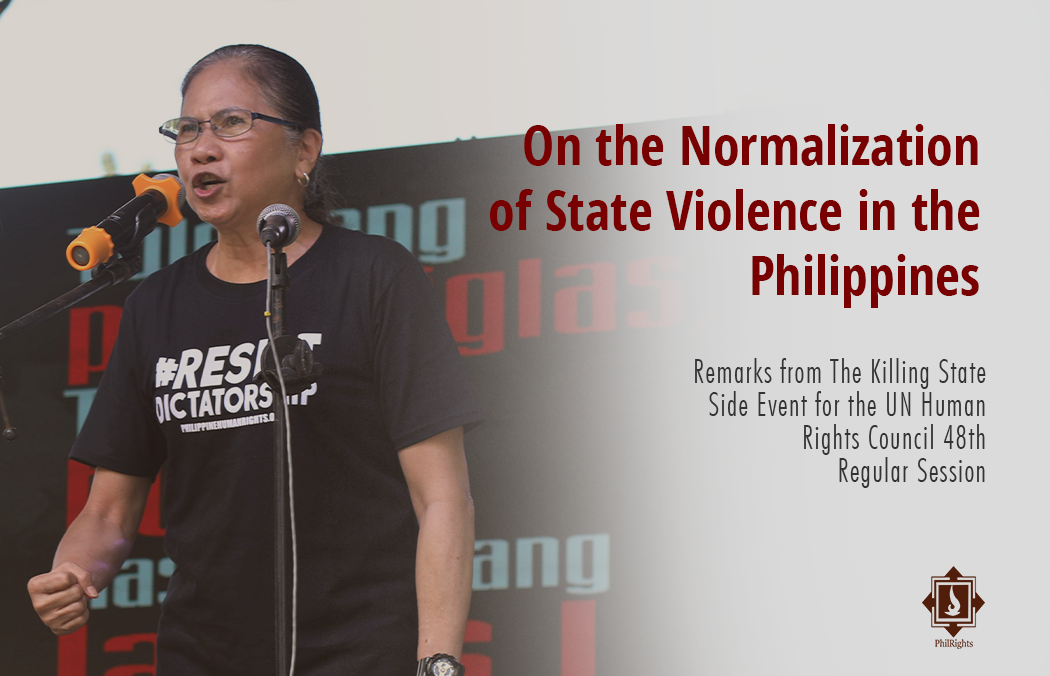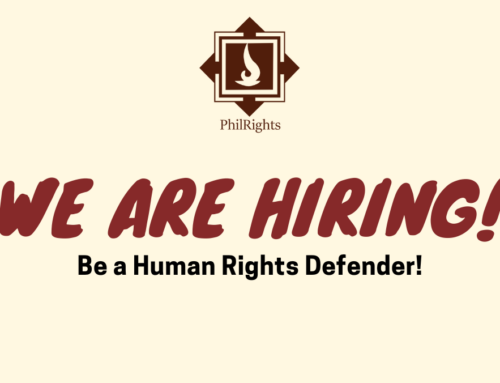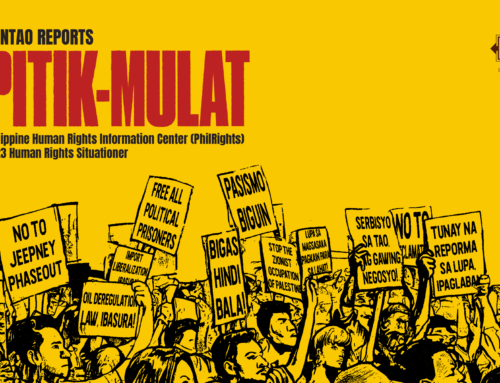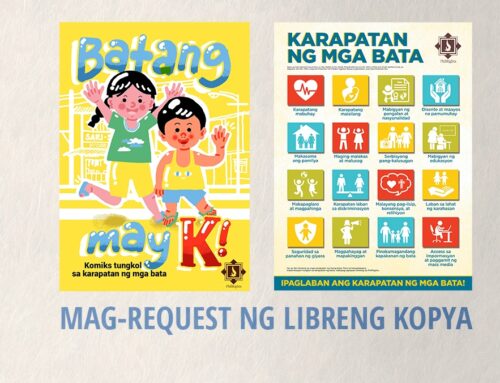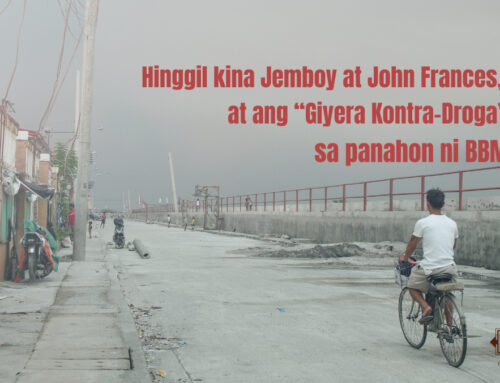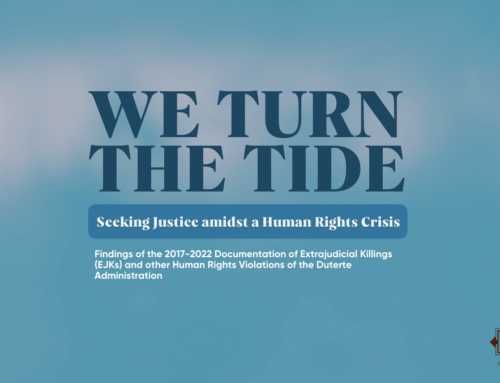Remarks of Prof. Nymia Pimentel-Simbulan, Executive Director of the Philippine Human Rights Information Center (PhilRights) and Chairperson of the Philippine Alliance of Human Rights Advocates (PAHRA) during The Killing State: Confronting the Normalization of State Violence in the Philippines, a side event for the 48th session of the United Nations Human Rights Council, held October 7, 2021.
Greetings and a pleasant day to everyone.
To the representatives of the UN Human Rights Council member-states’ capitals, representatives of Geneva missions, to our friends from the diplomatic community here in the Philippines, to our international partners who helped us put this event, and to our audience watching this live on YouTube and Facebook–a pleasant day.
I’d like to thank everyone for joining us today in our second side event coinciding with the 48th Session of the UN Human Rights Council. This past Monday, we heard from our colleagues their insights and analyses on the state of human rights defenders in the Philippines.
For this particular side event, my colleagues and I intend to expand this discussion by tackling the overall human rights situation in the Philippines, with specific focus on the prevalence of violence as a State policy, the derogation and worsening conditions of economic, social, and cultural rights of Filipinos, and finally, the Philippine Alliance of Human Rights Advocates’ (PAHRA) recommendations on how we can all work together to urgently address these issues.
I would like to use my time to highlight the human rights analyses and research conducted by the Philippine Human Rights Information Center or PhilRights, the research and information arm of PAHRA, through reports the institution has published under the “The Killing State” banner.
Let me begin by highlighting the fact that President Duterte has made it clear from the very start that he intended to use his presidency to further the kill policies he instituted as mayor of the city of Davao. The so-called war on drugs, put in place in 2016, has precipitated a full-blown human rights crisis that has expanded to include wide-ranging attacks against human rights defenders, activists, critics, members of progressive organizations, the mass media, and the basic sectors.
Through the documentation work done by PhilRights and other human rights organizations on extrajudicial killings and other human rights violations perpetrated in the context of the so-called war on drugs, we were able to collect data, record statements, and compile stories of witnesses, families left behind of 180 alleged victims of extrajudicial killings and 47 alleged victims of other human rights violations such as illegal arrest and detention, enforced disappearances, and torture.
What the data reveal are: The so-called war on drugs is a war against the poor. The victims documented have mostly come from the urban poor sector. Their profile tends to be that they are male adults, who are often family breadwinners, earning low and/or irregular wages. This last fact is important. On the average, a victim contributed around 40% of the household income and so their deaths have significant negative repercussions for the families left behind, on top of the trauma of losing a loved one experienced by families. Altogether, the 180 documented victims left behind 279 children.
Almost half of the documented killings occurred in police operations or while the victims were under police custody. The rest were killed in unofficial operations which informants or witnesses allege were conducted by police or by unidentified assailants or vigilantes.
Almost all documented victims bore gunshot wounds. One in four allegedly endured signs of torture, including beatings, dismemberment, broken limbs, missing fingernails, and burn marks.
These 180 killings, to say nothing of the thousands of other cases not covered by our study, deserve to be investigated. Yet, we only know of 12 cases where police conducted for the victim’s families an investigation.
This is a gross failure on the part of the State to guarantee due process and afford protections against misuse of force by State security agents. What’s more, we regularly receive reports from our community partners of efforts by the police to harass, pressure, or at the very least discourage families of EJK victims from filing cases and complaints against perpetrators.
There is also clear intent to muddle the truth about the implementation of this so-called war on drugs. Apart from insisting on the nanlaban narrative—where police and government officials proclaim that those killed fought back—there are also documented cases of erroneous or misdeclared information on death certificates of EJK victims. Among our cases, we have seen 10 EJK victims who were described as having died from cardiac arrest, myocardial infarction, pneumonia or acute respiratory distress syndrome. Three in four of the families documented have reported difficulty in accessing or securing official documents about their dead relatives, especially police and medico-legal reports.
The sheer number and violence of these killings, occurring since 2016, have created a culture of fear and insecurity in many urban poor communities. This highlights one important fact about the so-called war on drugs: the impacts of EJKs are multidimensional and interrelated. Families left behind reported deterioration in the quality of life, especially in terms of livelihood, food security, physical and mental health, and children’s education.
Allow me also to address a question that always gets asked about why the so-called wars on drugs and terrorism appear to have public support. There are many ways to look at this question and even more ways to answer it. However, a key factor that enabled all of this is that President Duterte and his allies have succeeded in their efforts to distort, misrepresent, and villainize human rights.
The use of terror tactics in the form of threats and harassments have proven to be effective in sowing fear and silencing sections of the population. This administration has painted a negative picture of human rights and human rights defenders in rhetoric and action. At work is a wide-ranging application of Pres. Duterte’s core principle of governance, which is based on violence. By framing civic participation as a destabilizing force, painting a broad red brush against individuals and groups who dare to bare the truth about the abuses and violations occurring in many parts of the country, and weaponizing the law against civil society and the media, civic spaces in the Philippines have essentially shrunk to conditions comparable, if not worse, to Martial Law era.
And so it bears repeating: we are in a human rights crisis, one that has caused and is continuing to cause suffering and will have manifold impacts in the years to come. The damage, not only on the meltdown of democratic safeguards but also on civic behavior, will be long-term.
With this in mind, we call upon our friends in the international community to stand in solidarity with us in our efforts to curtail the growth of this malignant force. It all starts with a united stance in seeking an impartial, independent, international investigation into the human rights situation in the Philippines.
Let me end by sharing with you a few messages from some of the families and loved ones left behind by EJK victims. We acknowledge that these engagements must always include their voices, their aspirations. Here are some of their messages.



